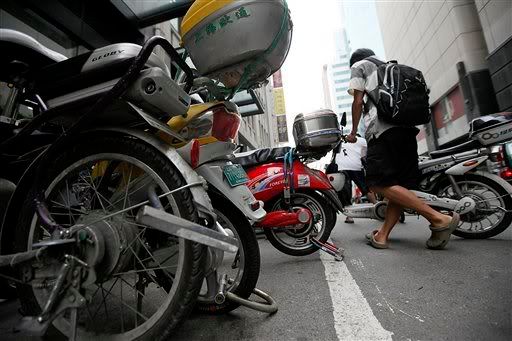From The Telegraph:
There's no doubt that there will be plenty of people willing to populate this new monstrosity. Tens of millions of people flock to Chinese cities every year. Everybody in China wants to get in on the new opportunities city life provides.
City planners in south China have laid out an ambitious plan to merge together the nine cities that lie around the Pearl River Delta.
The "Turn The Pearl River Delta Into One" scheme will create a 16,000 sq mile urban area that is 26 times larger geographically than Greater London, or twice the size of Wales.
The new mega-city will cover a large part of China's manufacturing heartland, stretching from Guangzhou to Shenzhen and including Foshan, Dongguan, Zhongshan, Zhuhai, Jiangmen, Huizhou and Zhaoqing. Together, they account for nearly a tenth of the Chinese economy.
Over the next six years, around 150 major infrastructure projects will mesh the transport, energy, water and telecommunications networks of the nine cities together, at a cost of some 2 trillion yuan (£190 billion). An express rail line will also connect the hub with nearby Hong Kong.
"The idea is that when the cities are integrated, the residents can travel around freely and use the health care and other facilities in the different areas," said Ma Xiangming, the chief planner at the Guangdong Rural and Urban Planning Institute and a senior consultant on the project.
Read On
The audacity of this plan is startling. This project in southern China makes previous large infrastructure projects - the Panama Canal, the US interstate highway system, and even the Three Gorges Dam - seem like child's play. The logistics involved with creating such a vast "city" is on a totally different plane from previous man-made ventures.

Image of Shenzhen from Reuters
Reading this story today, I immediately thought of some of the words President Obama said last night in his State of the Union address. From near the end of his speech talking about the need for the US to become a more competitive nation:
There's no question who these words were targeted towards. China is a challenge Obama has to deal with every day.We should have no illusions about the work ahead of us. Reforming our schools, changing the way we use energy, reducing our deficit — none of this will be easy. All of it will take time. And it will be harder because we will argue about everything. The costs. The details. The letter of every law.
Of course, some countries don't have this problem. If the central government wants a railroad, they build a railroad, no matter how many homes get bulldozed. If they don't want a bad story in the newspaper, it doesn't get written.
And yet, as contentious and frustrating and messy as our democracy can sometimes be, I know there isn't a person here who would trade places with any other nation on Earth.
The Entire Transcript
Obama spent last week schmoozing President Hu here in the US. He surely hears everyday from disgruntled voters out of work due to "jobs being shipped over to China." Forty-seven percent of Americans believe, incorrectly, that China's economy is the largest in the world.
I was moved by Obama's speech last night. I've seen many mock his "Sputnick-moment" rhetoric. I'm also not sure that the post-partisanship he's pushing for is going to last. But I appreciate the, to borrow a word I've already used in this post, audacity of what he said last night.
No matter what one thinks of Obama and his policies, he proved last night that he understands what has made the US what it is. His exhorting of innovation and ingenuity in the face of strong challenges from abroad was inspiring.
Is China's economy and world influence going to surpass the US in the coming decades? Most likely it will. Considering its population, it's not that surprising that it would. But even if it does, I think there's something to what Obama said in his speech.
China's economy can and will continue to boom. It will build cities and undertake projects that put America to shame. No matter how big it gets, though, China's citizenry is still not going to have basic rights that citizens of the US and other democracies enjoy. No amount of development or wealth creation will ever be able to make up for the basic freedoms denied in China.
































